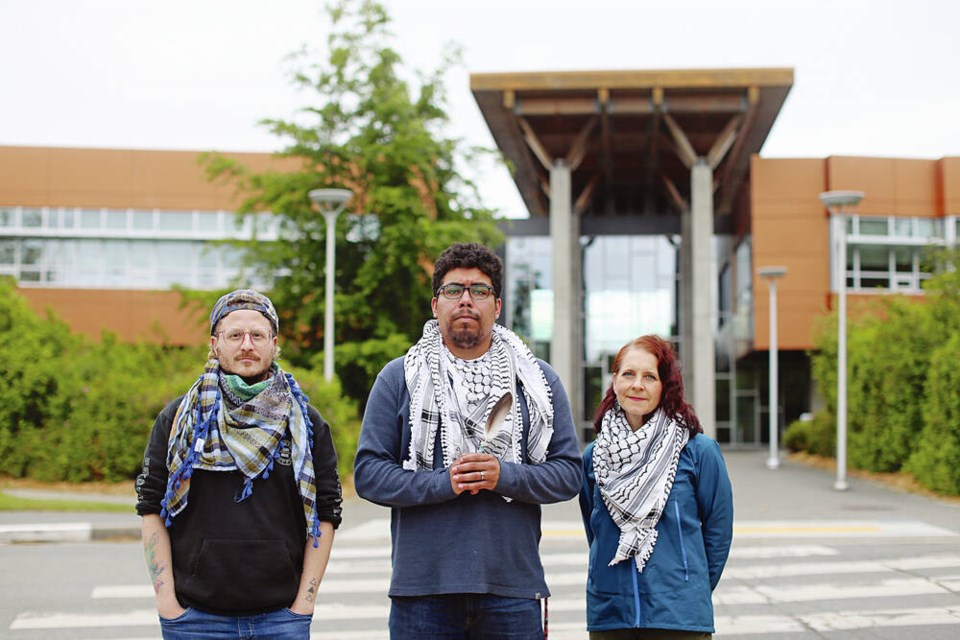University of Victoria leaders say they will meet this week with students from the pro-Palestinian encampment that has been set up on campus.
Elizabeth Croft, vice-president academic and provost, said in a statement Tuesday that the university is hopeful for dialogue “towards a peaceful resolution.” Croft, who has not responded to interview requests, did not say when the meeting would occur or who would be present.
Representatives of the UVic encampment, which was established May 1, did not respond to a request for comment Tuesday.
Last week, four professors looking to hand a letter to UVic president Kevin Hall and other university executives urging them to begin talks with the protesters, said they were barred from entering the university’s main administrative building by security.
Deondre Smiles, an assistant professor in geography, said they were approached by a guard asking if they had a prior appointment. When they said no, security guards began securing the building, he said.
“They were coming out of the woodwork to secure us,” Smiles said. “We were no threat. We had identified ourselves by name. We were carrying letters.”
Pacific and Asian studies professor ann-elise lewallen said the security response was unusual as she was able to enter the building unchallenged while delivering another encampment-related letter to the president’s office earlier this month.
Six to eight campus security officers and one Saanich police officer were deployed in the incident last Wednesday, said Pierre-Luc Landry, one of the professors involved. Three of the four professors were wearing keffiyehs, a checkered scarf that has come to symbolize solidarity with Palestinians.
After being asked to wait for 25 minutes, the professors were able to provide copies of the letter — signed by 92 faculty members — to two UVic vice-presidents. The following day, UVic issued a lengthy statement in response to protesters’ demands, which include calls to divest from corporations supporting Israel, cutting academic ties to that country and for UVic to “condemn the ongoing genocide of Palestinians.”
The statement, signed by Hall, Croft, and Kristi Simpson, the university’s vice-president of finance and operations, called protesters’ demands “complex” and said they had implications for academic freedom and freedom of expression.
UVic should not speak on global conflicts to avoid hindering free inquiry and expression, it said.
Landry, an assistant professor in French and francophone studies, said the university’s response is inconsistent, given Hall’s statement in 2022 condemning Russia’s attack on Ukraine. “It basically says we can have an official position when the people involved are white people, are Christian people,” said Landry.
Vancouver Island University professor Evan Hoffman, a de-escalation expert, said recent developments at McMaster University in Ontario — where pro-Palestinian protesters disbanded their encampment following negotiations — show talks can result in changes. Trying to break up encampments by force could backfire for a university, said Hoffman, who helped develop the Ottawa police force’s first de-escalation training course 13 years ago.
“You’re not building up relationships, you’re not addressing the underlying problem or the underlying issues or concerns. You’re potentially helping the movement grow even bigger.”
Universities have to walk a delicate line in recognizing the rights to free speech while protecting health and safety and ensuring protests don’t cross the line into hate speech and threats, he said.
“I don’t envy the administrators because they’re being pulled in those two different directions. No matter what stance they take, they’re going to get flack for it.”
UVic has made blunders by providing unclear and inconsistent information about a camera that was placed in a spot overlooking the encampment, and by sending to earlier talks representatives who appeared not to be empowered to discuss demands, Hoffman said.
The admission that a security camera had indeed been placed on the university library roof — which had been denied on two occasions by Hall — created further distrust and put UVic in “major damage-control mode,” Hoffman said.
Following a report by CHEK News, the university released a statement saying a camera was placed on the roof on May 8 for the purposes of “checking feasibility” but was never enabled or actively used. “If I was a protester, I would perhaps be upset by that,” he said. “You can understand from their perspective why maybe they would have even seen that as an insult.”
Universities have the option of waiting out the encampments, which may not last through the hot summer months, he said. “The news cycles moves so fast, people’s attention spans are short and the academic year is winding up.” On the other hand, Hoffman said the latest developments in Rafah may continue to keep emotions high.
On Sunday, at least 45 people were killed in a fire in a tent camp near Rafah following an Israeli airstrike, according to the Gaza Health Ministry, sparking protests in Victoria and Nanaimo.
The Israeli military has said an initial investigation into the strike, which it said was targeting two senior Hamas militants, has found the blaze was caused by a secondary explosion.
— With a file from the Associated Press
Note to readers: This story has been updated to include more information about the airstrike on Sunday.
>>> To comment on this article, write a letter to the editor: [email protected]



